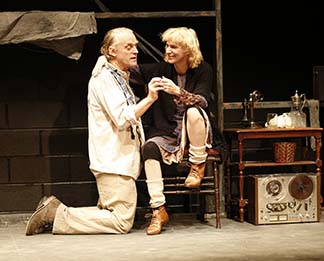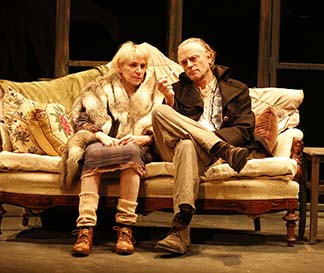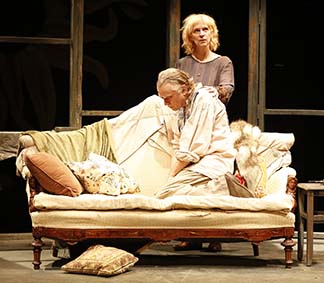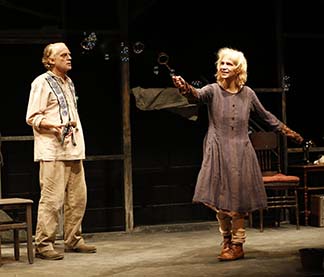By Lucy Komisar

Delicious surreal theatrical games are featured in Tennessee Williams‘ Southern Gothic drama of brother and sister actors of a failed theater company where the characters in a play-within-a-play mirror the duo‘s real-life desperation.
Williams, the famous chronicler of Southern psychological disintegration, goes one better by giving the neurotic pair, Clare (Amanda Plummer) and Felice (Brad Dourif), a life as absurd as in the interior play. The actors are brilliant in the expression of their characters‘ neuroses.
Plummer sometimes reminds one of a crazy bag lady, and Dourif captures the bi-polarity of Felice (which means happy in French) who sometimes seems more solid than Clare but we learn also once inhabited State Haven. Director Gene David Kirk creates the feel of an edgy dark movie.

The actors move between a slightly seedy stage and an inner space that represents a southern living room. If plays are about unreality so is their life. Felice tells Clare the audience is coming in. She insists there is “no show.”
They are on tour. The last few seasons have been disasters.In fact, they get a telegram from the company complaining that as they haven‘t been paid, they are decamping.
Actually, the cable is rather blunt: Your sister and you are”insane”Having received no pay since”“ The match Felice is holding burns out. He strikes another. We’ve borrowed and begged enough money to return to” But patrons and critics might show up.

The mood is as dark as the decrepit theater. The two rehearse dialogue about fear. They attack each other. Felice says, “Your voice is thick, slurred, you’ve picked up”vulgarisms of”gutters!” Clare interrupts, “What you pick up is stopped at the desk of any decent hotel.” But sometimes they soothe each other. It‘s a pas de deux of two people who cling to each other even as they snipe at each other.
Since the other actors have departed, they must put on The Two-Character Play, but to what extent are they playing roles? Felice says, “You know I wear a wig for the role of Felice.” Clare responds, “The part of Felice is not the only part that you play.”
The characters in the play, also called Clare and Felice, are living in a house that reminds one of the theater. It is not lighted, and it is empty except for them. In the play, their father shot their mother and left them as recluses without money – no insurance was paid as a result of the crime. They have run up a debt with Grossman‘s Market. In a fantasy of the Old South, they discuss if Clare should go “calling,” as ladies do. But she hesitates to go out, because there would be hostile people standing outside their house.

Williams enjoys a clever diversion. Clare notices a throne-chair, and declares, “Why, my God, old Aquitaine Eleanor’s throne! I’m going to usurp it a moment”“
And there‘s a bit of mystery when an unscripted revolver appears in the play. Felice declares with a hint of menace, “Now I remove the blank cartridges and insert the real ones as calmly as if I were removing dead flowers from a vase and putting in fresh ones.
Finally they discover that the doors of the cold theater are locked. The playwright gets in some personal licks, with Clare saying, “I’ve always suspected that theatres are prisons for players . . .” and Felice responding, “Finally, yes. And for writers of plays.”
To ward off the chill, they could put their coats on. But they could also disappear into the Southern play and experience the equally warming heat of an imaginary summer as the boundaries between fantasy and reality are blurred again.
“The Two-Character Play.” Written by Tennessee Williams; directed by Gene David Kirk. New World Stages / Stage 5, 340 West 50th Street, New York. 212-239-6200; 800 447-7400. Opened June 19, 2013; closes Sept 29, 2013. 8/8/13.

